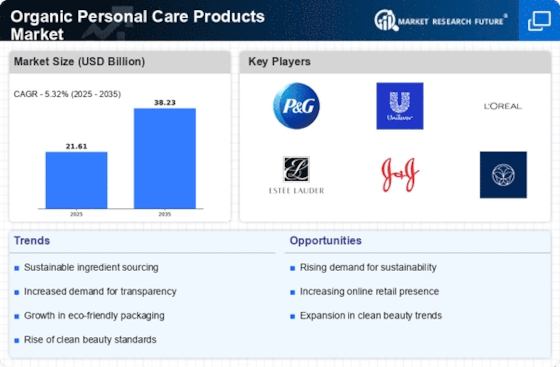Top Industry Leaders in the Organic Personal Care Products Market

Analyzing market share within the Organic Personal Care Products sector involves considering multiple factors. Brand reputation, product quality, pricing strategies, and consumer trust in ingredient transparency significantly impact market positioning. Companies focusing on certification from organic standards organizations, such as USDA Organic and Ecocert, often enjoy higher consumer trust. Additionally, factors like product innovation, including unique formulations and catering to specific skin types or concerns, play a crucial role in capturing market share.
In parallel with established entities, new and emerging companies are entering this competitive arena. Start-ups and smaller ventures are emphasizing niche markets, such as vegan skincare, gender-neutral products, or ethnic-specific formulations, thereby targeting more specialized consumer segments. These emerging players leverage agility, innovation, and a focus on ethical and sustainable practices to carve a niche in the market and appeal to environmentally conscious consumers.
Industry news in the Organic Personal Care Products market predominantly revolves around sustainability efforts, mergers, acquisitions, and innovative product launches. Notably, the industry is witnessing a surge in collaborations between established brands and smaller, innovative companies, aiming to combine the expertise of established players with the agility and fresh perspectives of emerging brands. Additionally, a notable shift in consumer preferences towards transparency in labeling and a greater demand for cruelty-free and vegan products is reshaping the market landscape.
Current investment trends within this market showcase a strong emphasis on research and development to enhance formulations and meet evolving consumer demands. Companies are investing significantly in sustainable sourcing practices, renewable packaging solutions, and reducing their carbon footprint along the supply chain. Additionally, investments in digital marketing strategies and e-commerce platforms to reach a wider audience and capitalize on the growing trend of online shopping for personal care products are becoming increasingly prevalent.
The overall competitive scenario within the Organic Personal Care Products market is dynamic and evolving. Established players face heightened competition from agile and innovative newcomers. Differentiation through product innovation, commitment to sustainability, transparent communication, and ethical practices remains pivotal. The ability to resonate with evolving consumer preferences for natural, safe, and environmentally friendly products will dictate a company's success and competitive standing in this rapidly expanding market landscape.
Industry News and Investment Landscape:
- Acquisitions in the recent past, such as Unilever's acquisition of REN Clean Skincare, point to market consolidation patterns.
- A future-focused approach is shown by increased investments in R&D, with an emphasis on innovative organic components, bio-based polymers, and sustainable production techniques.
- Market expansion is driven by rising consumer knowledge of environmental issues and the advantages of organic products, which is pushed by social media and influencer endorsements.
Key Companies in the Organic Personal Care Products market include –
- The Estée Lauder Companies Inc. (US)
- Revlon Inc. (US)
- Unilever PLC (UK)
- Shiseido Company Limited (Japan)
- Mary Kay Inc. (US)
- The Procter & Gamble Company (US)
- L’Oréal S.A.(France)
- Coty Inc. (US)
- Beiersdorf AG (Germany)
- Kao Corporation (Japan)











